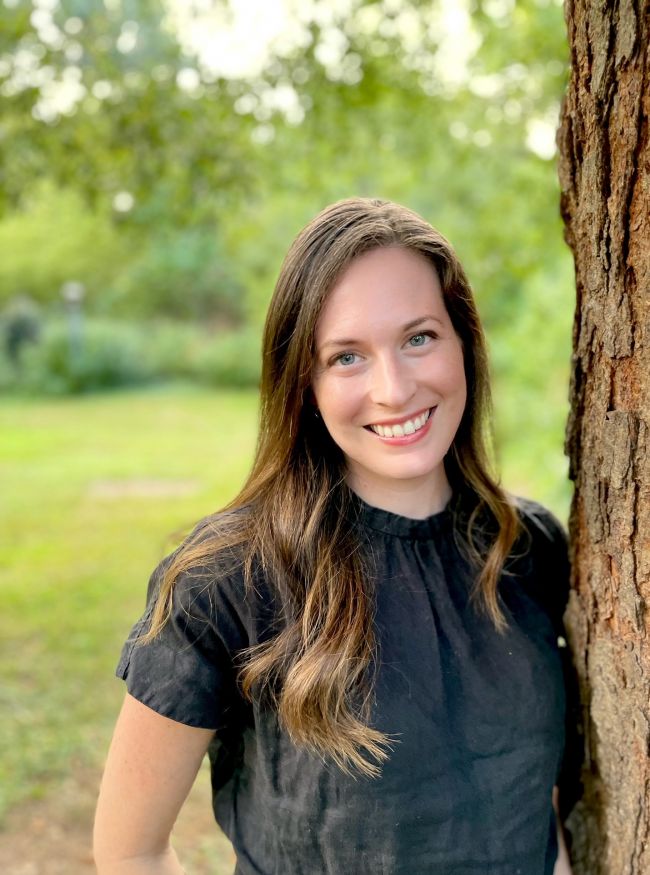DITA's newest Th.D. student is no stranger to the school. Allison Garde is a graduate of Duke Divinity School, where she completed a Master of Theological Studies with a Certificate in Theology and the Arts in 2023. Her research interests lie at the intersection of literary theory and Biblical Theology: she aims to investigate the biblical reader-text relationship through the lens of literary theory and semantic philosophy.
Garde’s research interests in this area began in the classroom. After completing an undergraduate degree in literature at Abilene Christian, Garde taught humanities for eight years, to a variety of grades and contexts in Cincinnati, San Antonio, and Houston. She initially pursued teaching as a logical progression from studying literature, but within the second year of teaching at an independent Christian school in Cincinnati, her passion for her students quickly sparked a delight in the classroom and in teaching. Paradigms shifted, and Garde committed to learning the ins and outs of pedagogy to better serve her students academically and holistically.
“I realized the classroom was a creative space for me. I began to think of it as my art studio, and I wanted to pursue further education to form my students as best as I could.”
After moving to Houston, TX, Garde surveyed several graduate programs and decided to study reading practices in the classroom, completing a Master of Liberal Arts from Houston Christian University in 2018. This program proved a pivotal point in her teaching career—and eventually shaped her vision for further doctoral work. Through her coursework at HCU, Garde came to see a connection between the reading of literary texts and the reading of the Bible. She began to reflect on the intersection of literary theory and biblical interpretation—and she began to do the strenuous work of translating academic study to pedagogical praxis.
“I continued to teach through my degree, and I noticed that I started to teach theology in my language arts and literature classrooms. Somehow, studying reading theory and literary form led me to teaching theological texts.” She assigned readings from Augustine and Flannery O’Connor, then from the Gospel of John and Genesis. And she was surprised by the responses these texts garnered.
“Students reacted completely differently to the Bible than they ever had before. They noticed moments in the narratives and stories that I had overlooked. Putting the Bible in a literary context prompted a new and surprising engagement with biblical texts,” she says. “That’s when I knew I needed to pursue formal theological training.”
When COVID hit and schools shut down in 2020, Garde took the natural pause as an opportunity. She applied to Duke in the fall of 2020 and began the M.T.S. in 2021. After arriving, she quickly found a home at DITA. The theological commitments and artistic framework engrained in DITA and the Certificate’s core principal were directly in line with her own pedagogical practices and experiences: art is not merely a tool or enhancement to learning but is itself a form of theological understanding.
“You cannot separate human experience and expression,” says Garde. “DITA knows that and takes it one step further: you cannot separate human expression and theology. I knew I was in the right place.” After completing coursework with Dr. Dan Train and Dr. Jonathan Anderson, Garde knew she wanted to pursue doctoral work. During the M.T.S., she completed interdisciplinary courses that would support her study of literary theory and Biblical Theology. Dr. Katie Benjamin’s course on the History of Biblical Interpretation and Dr. Chapman’s work on the theological interpretation of the Old Testament helped her situate her research interests within the development of the Christian tradition and the canon of orthodox theology. Dr. Janet Soskice’s course Love & Desire cemented her commitment to complete doctoral work, and Garde eventually expanded a paper for Soskice’s course into her master’s thesis for the Certificate.
“I proposed that the literary theory and semantic language of Mikhail Bakhtin can be used to formulate a deep love for Scripture that ultimately leads to lived practice.” While she wrote this extended academic study, she pursued an application for the Th.D in Theology and the Arts.
“I was thrilled to be accepted to Duke. I didn’t interview anywhere else because I knew that DITA and Duke Divinity were the only place I could thrive as an academic and as a person.” And it has been an excellent fit. “Duke is the perfect place for me to study,” she says, “because it is deeply committed to interdisciplinary work—and cross-departmental collaboration.” She is delighted for the opportunity to pursue coursework on literary theory and philosophy through the University’s English Department as well as theological study at the Divinity School. And Duke Divinity’s unique emphasis on the centrality of biblical interpretation offers her project solid hermeneutical grounding.
“At DITA and Duke Divinity, all my academic interests and needs naturally coincide: art, theology, literary theory, and a renewal of interest in the history of biblical interpretation.” Lastly, the Th.D.’s express goal of forming academics for the classroom matched her own pedagogical commitments.
“The classroom remains central to my thinking,” she says. “And one key question fuels all of my academic work and research pursuits: What sort of education do I need to help my students understand—and live—the Bible?” We’re grateful she’s found a home here, and we look forward to learning alongside her at DITA and Duke Divinity and in the classrooms beyond.
